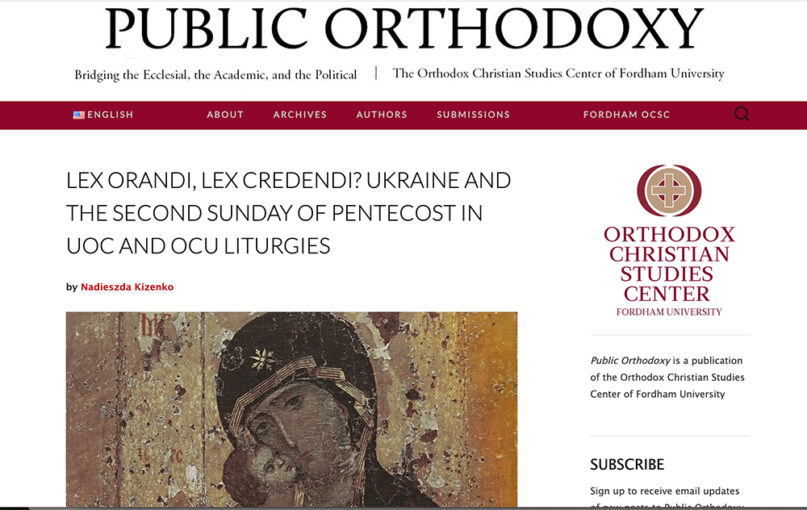(RNS) — Sergei Chapnin, a senior fellow at Fordham University’s Orthodox Christian Studies Center, was at an academic conference in early June when he began to hear from people in Russia that his articles on Public Orthodoxy, a blog hosted by the center, weren’t available. He soon discovered that the Russian government had blocked the site completely inside the country.
“It’s clear that the critique of our Orthodox Church and (Russian President Vladimir) Putin’s regime was really sharp,” said Chapnin, who worked for the Moscow Patriarchate from 2009 to 2015, including a stint as editor of the official magazine of the Russian church.
Public Orthodoxy operates independently of any official body of the Orthodox Church, and contributors to the blog represent a wide range of Orthodox Christian traditions. Since 2015 Public Orthodoxy has been posting articles on the environment, women in the church, the relationship between faith and politics and related topics.
“The idea is that we have a global network of scholars in a multitude of disciplines to weigh in on issues of current concern in the Orthodox Church,” said George Demacopoulos, professor of theology at Fordham and co-director of the OCSC. He added that Public Orthodoxy is “written not for scholars,” but rather “for public consumption.” It appears in seven languages, including Russian.

George Demacopoulos. Courtesy photo
“We’ve been writing about the threat of Putin to Orthodoxy for years,” added Demacopoulos. “In some sense, I’m surprised it didn’t happen sooner.”
RELATED: UK sanctions Russian Orthodox head; decries forced adoption
But since Russia’s invasion of Ukraine, Public Orthodoxy has focused almost exclusively on the Ukraine crisis.
In February, monthly traffic to the site doubled from 30,000 to 60,000 views, reaching a peak at 160,000 views in March. Readers spread outside its accustomed Orthodox religious and scholarly communities, including staffers at the U.S. State Department. Contributors began debating the theological foundation to Putin’s action in Ukraine, much of it supplied by Russian Orthodox Patriarch Kirill, along with a host of other issues facing the Orthodox Church in light of the conflict.
“The position of Patriarch Kirill in this war, in his sermons and public statements, revealed for many how deep, in fact, the church is involved in Russian politics,” said Chapnin.
Public Orthodoxy’s exploration of that entanglement is likely what caused Russia to block the site, according to Chapnin. “For the state, even the critique of the church and of Patriarch Kirill is not as sensitive as the critique of the Kremlin or Putin’s regime,” he said.
According to a report produced by three Russian human rights organizations for the United Nations in May, in the last two years Russia has increased the power of Roskomnadzor, the Russian federal agency that oversees communications and mass media, to block media as the agency chooses. These restrictions only accelerated with the Russian invasion in late February.

Sergei Chapnin. Courtesy photo
Legal scholars at Stanford University’s World Intermediary Liability Map, a project that tracks internet regulations worldwide, said the legislation allows the government to target information the Russian state considers “fake news.”
RELATED: Ukrainian Orthodox primate: ‘We are called to stop this evil’
While Public Orthodoxy’s sponsors are glad to have the increased readership at a crucial time for Orthodox Christianity, they seem to have taken especial pride in being blocked by the Kremlin.
“I congratulate … all the editors and authors of the Public Orthodoxy blog with this ‘recognition’ by the Russian state,” Chapnin tweeted on June 2.
In an interview with Religion News Service, he added, “If they decided to ban a web project with a small audience, that means they take seriously the critique and they have some kind of fear that this critique will reveal something important.”





